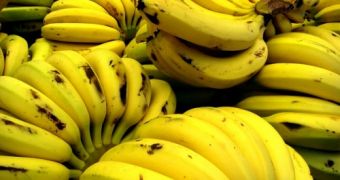It is quite likely that most of you have experienced the following phenomena at least once or twice in your life up until now: one buys a bunch of bananas, leaves them on the table and goes away for the weekend; when one returns home, the bananas have pretty much turned into a disgusting-looking mush and can be thrown in the trash.
However, it seems that researchers have finally come up with a solution to this highly annoying problem.
Thus, during this year's meeting of the American Chemical Society, a team of scientists revealed that their investigations in the field of rotting fruits and vegetables have led to the development of a spray-on coating which is quite successful in delaying the occurrence of this natural phenomena.
Eurek! Alert informs us that the innovative compound which could soon be used on a large-scale both by individual buyers, and by supermarkets, is basically a superabsorbent material that can both kill bacteria, and cut down on the breathing rates of fruits and vegetables, thus slowing down on the process of ripening.
“Once bananas begin to mature, they quickly become yellow and soft, and then they rot. We have developed a way to keep bananas green for a longer time and inhibit the rapid ripening that occurs. Such a coating could be used at home by consumers, in supermarkets or during shipment of bananas,” explained Xihong Li, one of the specialists involved in this study.
He further added that, “We found that by spraying green bananas with a chitosan aerogel, we can keep bananas fresh for up to 12 days.”
Apparently, this technology need be further improved on so as to make sure that the spray-on coating used to keep our fruits and vegetables fresh for longer periods of time poses no threats for public health, but it is quite likely that researcher Xihong Li and his team will soon succeed in making it available on the market.

 14 DAY TRIAL //
14 DAY TRIAL //